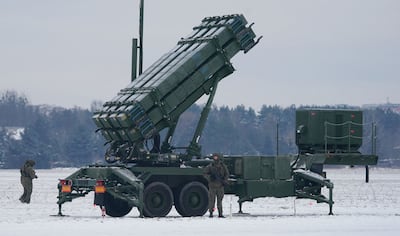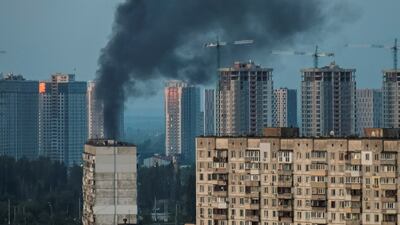Ukraine came under an “unprecedented” air attack early on Thursday, as rail traffic was suspended in the Crimean peninsula after an explosion on the line.
Russia launched cruise missiles at Ukraine's capital Kyiv and the Odesa region in an escalation as it awaits a Ukrainian counteroffensive.
Most of the missiles were shot down. One death was reported.
Rail traffic was suspended between Crimea's capital Simferopol and the city of Sevastopol, according to a Russian-installed official.
The region's Russian-backed governor Sergei Aksyonov posted on Telegram that wagons loaded with grain had been derailed and that there were no injuries.
The Baza Telegram channel, which has links to Russian security services, earlier reported an explosion on a railway line in the region, which was annexed by Russia in 2014.
It came as Ukraine’s head of military intelligence admitted the country’s agents had assassinated several Kremlin propagandists during the past 15 months, since Russia invaded.
“We’ve already successfully targeted quite a few people. There have been well-publicised cases everyone knows about, thanks to the media coverage,” Maj Gen Kyrylo Budanov told The Times.
Loud explosions were heard in Kyiv in the early hours, and falling debris caused a fire in a non-residential building.
It was the ninth Russian air raid on the capital this month.
The attack was carried out by strategic bombers from the Caspian region, probably using cruise missiles, and Russia later deployed reconnaissance craft over the capital.
Serhii Popko, the head of Kyiv's civil and military administration, said the attacks were “unprecedented in their power, intensity and variety”.
According to preliminary information, all enemy targets were destroyed, Mr Popko said in a Telegram post.
In the southern region of Odesa, one person died and two were wounded in a Russian missile attack, Serhiy Bratchuk of the Odesa military administration, said on Telegram.
“Most of the enemy’s missiles were shot down over the sea by the Air Defence Forces. Unfortunately, an industrial object was hit: 1 person died, two were injured,” the post said.
Earlier this week, Ukrainian air defences, bolstered by western-supplied systems, thwarted an intense Russian air attack on Kyiv, shooting down all missiles aimed at the capital, officials said.
The bombardment, which targeted locations across Ukraine, included six Russian Kinzhal aero-ballistic hypersonic missiles, the most fired in a single attack in the war so far, according to Ukrainian air force spokesman Yurii Ihnat.
The cruise missiles used on Thursday were apparently X-101 and X-55 types developed during Soviet times.
The hypersonic missiles used on Tuesday have been repeatedly touted by Russian President Vladimir Putin as providing a key strategic competitive advantage and among the most advanced weapons in his country’s arsenal. The missiles are difficult to detect and intercept because of their hypersonic speed and manoeuvrability.
Western air defence systems, including American-made Patriot missiles, have helped spare Kyiv from the kind of destruction witnessed along the main front line in the country’s east and south. While most of the ground fighting is at a stalemate, both sides are targeting other territory with long-range weapons.
Ukraine's air defences have played an essential role in protecting the country from strikes and preventing Moscow's forces from gaining control of the skies.
But as Russia faced increasing setbacks on the ground, it began air attacks that have disrupted electricity, water and heat to millions of people.

Grain deal extension
On Wednesday, Ukraine reached an agreement with Russia to extend a deal allowing grain exports across the Black Sea.
The deal, a rare example of co-operation between the warring sides, was welcomed by the UN and US, though both called for more certainty over the exports, as Russia has threatened to end the pact, which is crucial to global food security.
President Recep Tayyip Erdogan of Turkey, whose country has a central role in the grain deal, announced the two-month extension, saying Russia had agreed not to block ships from leaving two Ukrainian ports.
“These agreements matter for global food security. Ukrainian and Russian products feed the world,” said UN Secretary General Antonio Guterres.
“I hope we will reach a comprehensive agreement to improve, expand and extend the initiative.”
Russia has repeatedly threatened to pull out of the deal, which was meant to expire on May 18, and again on Wednesday denounced “disparities” in how it is implemented.
Kyiv has accused Russia of blocking its ships by refusing to register them and conducting lengthy inspections.
“It's a good thing that [the deal] has been extended,” said US National Security Adviser Jake Sullivan. “Unfortunately, Russia continues even in a moment of extension to rhetorically hold it hostage in various ways.”














